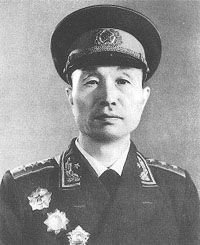This article needs additional citations for verification. (July 2009) |
Zhang Aiping (Chinese: 张爱萍; Wade–Giles: Chang Ai-p'ing; January 9, 1910 – July 5, 2003) was a Chinese military leader.
Zhang Aiping | |
|---|---|
张爱萍 | |
 | |
| State Councilor of the People’s Republic of China | |
| In office 19 November 1982 – 12 April 1988 | |
| Premier | Zhao Ziyang Li Peng |
| 6th Minister of National Defense | |
| In office 19 November 1982 – 12 April 1988 | |
| Premier | Zhao Ziyang Li Peng |
| Preceded by | Geng Biao |
| Succeeded by | Qin Jiwei |
| Vice Premier of the People's Republic of China | |
| In office September 1980 – September 1982 | |
| Premier | Zhao Ziyang |
| Personal details | |
| Born | Zhang Duanxu (张端绪) January 9, 1910 Da County, Sichuan, Qing Dynasty (now Dachuan District, Sichuan, China) |
| Died | July 5, 2003 (aged 93) Beijing, China |
| Alma mater | Counter-Japanese Military and Political University |
| Awards |
|
| Military service | |
| Allegiance | |
| Branch/service | People's Liberation Army |
| Years of service | 1929–1987 |
| Rank | General |
| Battles/wars | |
Biography edit
Zhang joined the Communist Party of China in 1928 after taking part in a communist-led rural uprising. He participated in the Long March and served as a field commander in the Chinese Red Army, first fighting against Chiang Kai-shek's Kuomintang forces, and later the Imperial Japanese Army in the Second Sino-Japanese War. During World War II Zhang commanded a guerrilla band sent to rescue U.S. flight crews who crash landed in China following the April 1942 Tokyo bombing raid led by Lieutenant Colonel Jimmy Doolittle. [1]
After 1949, Zhang was an important builder of the Chinese military forces. He commanded the first People's Liberation Army naval force and served as an army corps commander in the Korean War. Upon his return home he served in a series of significant military and political posts. He was made a General in 1955.
Zhang was accused of counterrevolutionary crimes and dismissed from all positions during the Cultural Revolution, when many veteran communists were attacked by Red Guards inspired by Mao Zedong's vision of continuous revolution, and one of his legs was broken as a result. Later, Zhang would comment: "The only thing the Cultural Revolution succeeded in was giving me a cane." He reappeared in 1973 and served as defense minister from 1982 until 1988. He served as deputy chief of the PLA general staff, vice premier, and chaired a key commission that sought to modernize the PLA.
During the Tiananmen Square protests of 1989, Zhang Aiping signed a letter opposing the enforcement of martial law by the Army in Beijing.
Due to the exigent circumstances, we as old soldiers, make the following request: Since the People's Army belongs to the people, it cannot stand against the people, much less kill the people, and must not be permitted to fire on the people and cause bloodshed; to prevent the situation from escalating, the Army must not enter the city.
— Ye Fei, Zhang Aiping, Xiao Ke, Yang Dezhi, Chen Zaidao, Song Shilun and Li Jukui, May 21, 1989, letter to the Central Military Commission and Capital Martial Law Command Headquarters[2][unreliable source?]
Zhang Aiping died in Beijing at the age of 93.
See also edit
References edit
- ^ "Zhang Aiping, 93; Headed China's Military, Nuclear Bomb Program". Los Angeles Times. July 9, 2003.
- ^ (Chinese) Wu Renhua, "89天安门事件大事记:5月21日 星期日" Accessed 2013-07-12